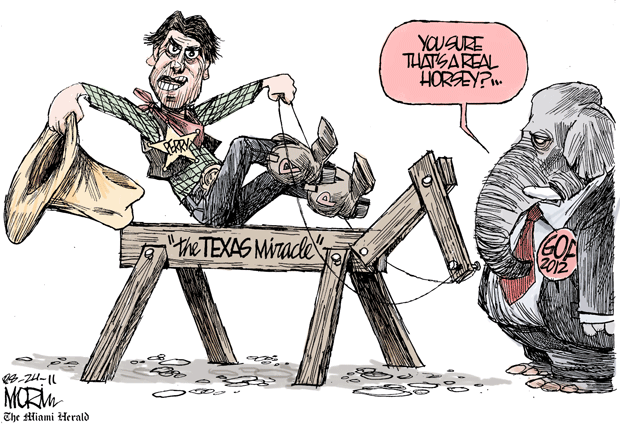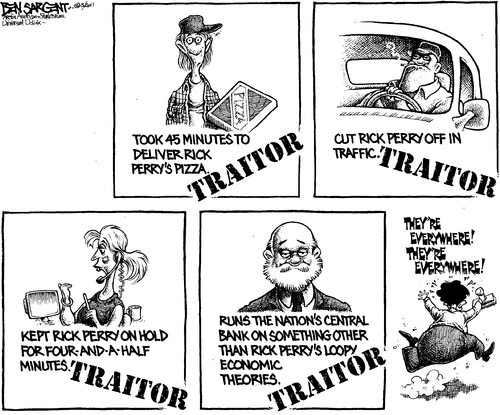“Punting the Pundits” is an Open Thread. It is a selection of editorials and opinions from around the news medium and the internet blogs. The intent is to provide a forum for your reactions and opinions, not just to the opinions presented, but to what ever you find important.
Thanks to ek hornbeck, click on the link and you can access all the past “Punting the Pundits”.
This is a very abbreviated preview. Most of the talk show are going to be concentrating on the storm that is now pounding the eastern seaboard. Since most of all of these show are based in either NYC or Washington, that shouldn’t be a surprise to our readers.
So unless you are somewhere that is not affected by Irene, haven’t lost power, are underwater or had your house blown away, good morning to stay in bed or do something else.
But just for you political junkies, here are a few pundits.
John Lewis: What would Martin Luther King Jr. say to President Obama?
Forty-eight years ago Sunday, when Martin Luther King Jr. was about to make his historic speech on the National Mall, I was huddled close to the statue of Abraham Lincoln, tapping on a portable typewriter, making last-minute changes to my own speech. As the newly elected chair of the Student Non-violent Coordinating Committee, speaking at the March on Washington was one of my first important actions. Dr. King spoke tenth; I was sixth. Today, I am the last surviving speaker from the march.
When I think back on that day, and the hundreds of thousands of people who responded to the call to march on Washington, there is no question that many things have changed. Then, Martin Luther King Jr. was a controversial figure taking risks so that his voice might be heard. Today, the mere mention of his speech – and its powerful “I have a dream” refrain – evokes hope for the future, stirring memories of the past and mandates for change, but the context in which Dr. King delivered those words was quite different.
Dana Milbank: Wanted: More bite from Obama the Great Nibbler
He declined a plate of bacon and eggs when sitting down to breakfast with a group of reporters this week because, the AFL-CIO president explained, he was concerned he might spit out a mouthful if he didn’t like a question. The stains on his Brooks Brothers necktie suggested this was more than a theoretical possibility.
So perhaps it should not be a surprise that Trumka has lost patience with the Great Nibbler in our civic life, President Obama. The president, he complained, has been doing “little nibbly things around the edge that aren’t going to make a difference and aren’t going to solve the problem” with the economy. Obama, he protested, decided to “work with the Tea Party to offer cuts to middle-class programs like Social Security.” And, Trumka accused, Obama has limited his proposals to “those little things that he thinks others will immediately accept.”
Without bolder action on the economy, Trumka told the gathering, organized by the Christian Science Monitor, “I think he doesn’t become a leader anymore, and he’s being a follower.”
The memorial to Dr. Martin Luther King opened on the Mall in Washington. Dr. King will take his place with Abraham Lincoln, Thomas Jefferson, George Washington and Franklin Delano Roosevelt. The monument features a 30-foot figure of Dr. King, hewn from granite, looking forward and very stern. This is the look of a man of action whose work is not done.
That is its power.
Dr. King was a man of peace, but he was not a passive man. He believed that confrontation in the face of indignation preceded reconciliation. To have healing, you must pull the glass from the wound. He was, as he said, a drum major for justice. He knew that peace was the presence of justice, not the absence of noise. And it could only be achieved through struggle, through the concerted actions of engaged citizens.
Maureen Dowd: Darth Vader Vents
WHY is it not a surprise to learn that Dick Cheney’s ancestor, Samuel Fletcher Cheney, was a Civil War soldier who marched with Sherman to the sea?
Scorched earth runs in the family.
Having lost the power to heedlessly bomb the world, Cheney has turned his attention to heedlessly bombing old colleagues.
Vice’s new memoir, “In My Time,” veers unpleasantly between spin, insisting he was always right, and score-settling, insisting that anyone who opposed him was wrong.
His knife-in-her-teeth daughter, Elizabeth Cheney, helped write the book. The second most famous Liz & Dick combo do such an excellent job of cherry-picking the facts, it makes the cherry-picking on the Iraq war intelligence seem picayune.
Nicholas D. Kristoff: Did We Drop the Ball on Unemployment?
WHEN I’m in New York or Washington, people talk passionately about debt and political battles. But in the living rooms or on the front porches here in Yamhill, Ore., where I grew up, a different specter wakes friends up in the middle of the night.
It’s unemployment.
I’ve spent a chunk of summer vacation visiting old friends here, and I can’t help feeling that national politicians and national journalists alike have dropped the ball on jobs. Some 25 million Americans are unemployed or underemployed – that’s more than 16 percent of the work force – but jobs haven’t been nearly high enough on the national agenda.
When Americans are polled about the issue they care most about, the answer by a two-to-one margin is jobs. The Boston Globe found that during President Obama’s Twitter “town hall” last month, the issue that the public most wanted to ask about was, by far, jobs. Yet during the previous two weeks of White House news briefings, reporters were far more likely to ask about political warfare with Republicans.
John Nichols: The Democrats’ Rural Rebellions
Democrats looking to Washington during the long, hot summer for signs of their party’s renewal got little in the way of relief. President Obama’s approval ratings tanked after he compromised away historic Democratic positions in the debt-ceiling fight. The party’s Congressional leaders, who in the spring had seemed prepared to fight off Republican attempts to erode Medicare, Medicaid and Social Security, sent so many mixed signals that it was difficult to tell whether the party wanted to fight austerity or embrace it.
Yet beyond the Beltway, a different story has been unfolding. And it holds out promise for a party that needs not just hope but a coherent strategy for the 2012 election season. Dramatic overreach by newly elected Republican governors, who sought to curtail labor rights, undermine local democracy and slash spending for education and local services, has provoked a backlash that draws stark ideological and political lines on fundamental economic questions. And that is winning substantial Democratic victories in unexpected territory, including rural areas where the party suffered its greatest setbacks in 2010.


 The largest act of civil disobedience by environmentalists in decades began outside the White House this morning, as more than seventy activists were arrested at the north gates during a protest against the Keystone XL pipeline, which if approved by the administration would carry 900,000 barrels of oil per day from Alberta, Canada to the Gulf of Mexico.
The largest act of civil disobedience by environmentalists in decades began outside the White House this morning, as more than seventy activists were arrested at the north gates during a protest against the Keystone XL pipeline, which if approved by the administration would carry 900,000 barrels of oil per day from Alberta, Canada to the Gulf of Mexico.
Recent Comments